Frank O'Hara in Guyana, January, 2002
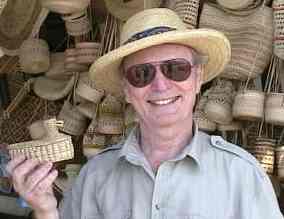
I arrived in Guyana on a Saturday. It was a very long day, beginning with getting up at 4:30 A.M. By the time I got to Guyana it was after 8 P.M. The woman at immigration required my local address. Maybe she thought I was a terrorist or that I wanted to sneak into the country. Of course, in my well organized fashion I had the address packed away in my suitcase. So she kept my passport and said I could come back and get it when I had the local address from the local CESO representative. Before I could meet the local person, I had to get the information from my baggage. It took an interminable amount of time for the baggage to come through. I guess they have to check each piece to see whether it is easily broken into. So I waited the better part of an hour for my baggage. Who could believe that ours was the only plane that had arrived that evening. Of course by the time I made contact with the nice person from CESO, who was picking me up aat the immigratio, the staff had all gone home. Well, at least they left my passport at an office in the airport (the far end of it) and I was able to get on my way, finally. I'll be sure, in the future, to put the local address (and make sure I know it) in my pocket.
I was rather hungry because the "snack" that they serve on the plane from Barbados is a small bag of chips. So we stopped on the way to my abode and picked up some Chinese food - not legitimate Chinese food but I was not questioning that at 10 PM. Finally, I got to bed, after 11 PM. Needless to elaborate, I slept without stirring for a full nine hours. I neglected to pull down the mosquito net (the first I had seen); so the mosquitoes had a good feed.
My host, Oliver Insanally, was a nice young fellow who got his post-secondary education in Florida. He took me on a driving tour of Georgetown Sunday afternoon. The city has the advantage of being quite flat. The country originally was a colony of the Netherlands. The Georgetown area is actually about 7 or 8 ft. below sea level. So the Dutch did, as in Holland, and built a dike to hold back the sea. The flat land that they recovered was planted in sugar cane and rice. The part that is not taken up by the city is still cultivated in those two crops. With the price of such crops very low, and not much else to export the country is not in a healthy financial position.
I met a couple of other CESO volunteers. One, with his wife, was on my flight from Toronto. The other we met on the way into the city. Both these fellows are staying at the chicken processing plant where they are working, and have quite nice accommodations.
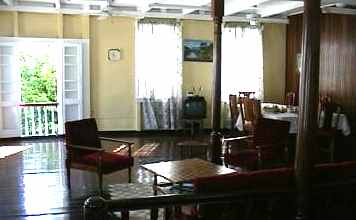 In the morning there was a nice woman to
make my breakfast. (This is a photo of the common living room.) I was the only
one in the house that has six bedrooms. A staff woman from CESO in Toronto
arrived the next day to to spend a week checking up on things. The place was
nicer than I have experienced in several of my other assignments. CESO has so
many volunteers going to Guyana that they have this house ready for their
arrival.
In the morning there was a nice woman to
make my breakfast. (This is a photo of the common living room.) I was the only
one in the house that has six bedrooms. A staff woman from CESO in Toronto
arrived the next day to to spend a week checking up on things. The place was
nicer than I have experienced in several of my other assignments. CESO has so
many volunteers going to Guyana that they have this house ready for their
arrival.
The weather was not as hot as I had expected and most of the time there is a pleasant breeze that flows through the very large windows throughout the house.
I was invited to a "briefing" meeting on Monday morning at the local office of CIDA (Canadian International Development Agency), which was a short walk from my place. Some of the information was so we wouldn't be at odds with the local culture, some of it to adjust to local ways of doing business and some of it to make it more likely to survive, either the food, the water or the criminals. (Of course, in all countries I wear a Canadian flag pin to prove that I am not an American and therefore not a good robbery prospect.) We also got quite a lowdown on the situation of the country, its history and where it stands now --- in a word - dire, both financially and socially. In my experience, though, there was no more danger here than in many other countries, including some parts of the USA.
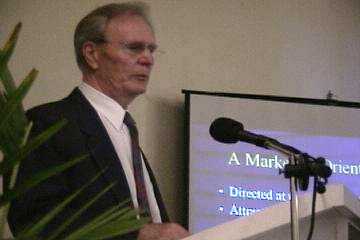 I gave a seminar on the
use of the Internet and website design features. The seminar went well. There
were about 100 in attendance, including the Prime Minister who said some words
of introduction. Afterwards, I had a word with him or more accurately, I gave
him a “shot” about the inadequacy of the telecommunications and how
it is holding back the economy. He was in agreement but he has political
problems not the least of which is that a previous government granted a
monopoly to an American company. The contract sill has a couple of years to
run.
I gave a seminar on the
use of the Internet and website design features. The seminar went well. There
were about 100 in attendance, including the Prime Minister who said some words
of introduction. Afterwards, I had a word with him or more accurately, I gave
him a “shot” about the inadequacy of the telecommunications and how
it is holding back the economy. He was in agreement but he has political
problems not the least of which is that a previous government granted a
monopoly to an American company. The contract sill has a couple of years to
run.
The questions asked were mostly realistic. I did get a few from left field. For example, one fellow asked, “Why does the ‘north’ prevent us people in the ‘south’ from having credit cards and thus hold back our development?” Another question was, “I bought something on the Internet and they didn't deliver it. What recourse do I have?” I asked him if he had never heard of “Buyer beware”.
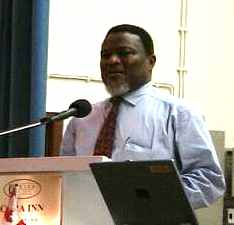 Prime Minister Hines says all the
right words about their utilizing the Internet but it remains to be seen
whether he can help fix some to the problems, notably the high cost of very
slow access to the Internet.
Prime Minister Hines says all the
right words about their utilizing the Internet but it remains to be seen
whether he can help fix some to the problems, notably the high cost of very
slow access to the Internet.
I thought I would be able to access the Internet from my “home” because the techies at the ISP where I worked set up my notebook computer but it didn't work. Patience is a virtue with which I have been getting some experience. However, I was able to access my email from the office Local Area Network.
At the end of my talk I spoke to a young woman who is in charge of the Tourist Promotion Dept. in the government. She wants me to come to Guyana again to help them design a tourism website for the whole country. They certainly need a first class website to promote tourism in general. However, to create a website that would stand up against the many first class such sites in the world they need a sophisticated site. I gave them an idea of what's required and the budget they would need. We'll see.
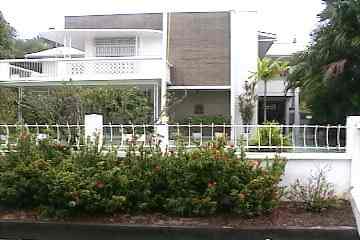 There are some
quite nice areas in Georgetown. The Canadian high commissioner's residence is
quite elegant. It's right next to the American ambassador's residence: notable
for the security precautions. Interestingly, Russia has greatly reduced it's
presence, although still substantial, while the Chinese have recently built an
enormous complex (again, with impressive fortifications). It's amazing the
attention given to a poor country of less than 700,000 people. It's enough to
make one ponder.
There are some
quite nice areas in Georgetown. The Canadian high commissioner's residence is
quite elegant. It's right next to the American ambassador's residence: notable
for the security precautions. Interestingly, Russia has greatly reduced it's
presence, although still substantial, while the Chinese have recently built an
enormous complex (again, with impressive fortifications). It's amazing the
attention given to a poor country of less than 700,000 people. It's enough to
make one ponder.
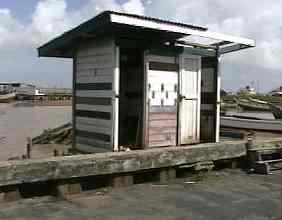 The CESO driver took me
on a trip outside of town to a big fair (flea market sort of place). Possibly
the most interesting thing about the place was the washrooms. Actually, it is
quite inappropriate to call them either washrooms or restrooms or even toilets.
There were two little huts that hung over a jetty. The tide was out so I could
look down quite a distance and see the sand, with an expected deposit
immediately below. Talk about a giant flushing system! I was glad I didn't have
to sit down because someone ahead of me didn't want to sit down either and his
aim obviously needed more practice.
The CESO driver took me
on a trip outside of town to a big fair (flea market sort of place). Possibly
the most interesting thing about the place was the washrooms. Actually, it is
quite inappropriate to call them either washrooms or restrooms or even toilets.
There were two little huts that hung over a jetty. The tide was out so I could
look down quite a distance and see the sand, with an expected deposit
immediately below. Talk about a giant flushing system! I was glad I didn't have
to sit down because someone ahead of me didn't want to sit down either and his
aim obviously needed more practice.
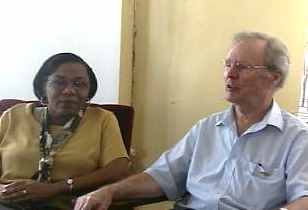 On my last day, one of the local
TV stations came to the house and did a "news" interview of Ruth Lee, the local
CESO representative and myself. (Obviously, they are suffering from a paucity
of newsworthy stories.) I used it as an opportunity to give the government a
shot about the need to improve telecommunications.
On my last day, one of the local
TV stations came to the house and did a "news" interview of Ruth Lee, the local
CESO representative and myself. (Obviously, they are suffering from a paucity
of newsworthy stories.) I used it as an opportunity to give the government a
shot about the need to improve telecommunications.
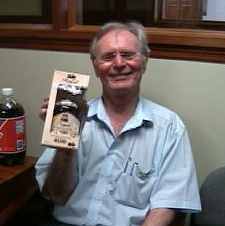 I never realized that Demerara
Rum was named after the Demerara river that flows through Georgetown. This
bottle was aged ten years. Guyana deservedly has a reputation of producing the
finest rum in the Caribbean. They say that the quality of the sugar cane is
what makes the difference.
I never realized that Demerara
Rum was named after the Demerara river that flows through Georgetown. This
bottle was aged ten years. Guyana deservedly has a reputation of producing the
finest rum in the Caribbean. They say that the quality of the sugar cane is
what makes the difference.
I made a number of sales calls with the staff of Guyana Net, Ltd. My final job was to do most of the development of a website for the parent company, an advertising agency called Guyenterprise Ltd.